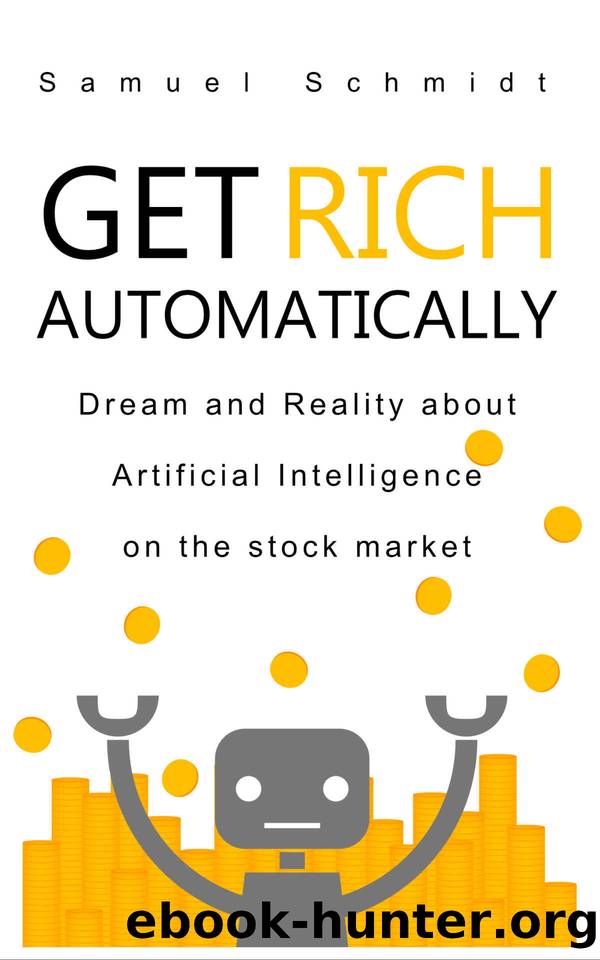Get Rich Automatically: Dream and Reality of Artificial Intelligence on the Stock Market by Schmidt Samuel

Author:Schmidt, Samuel [Schmidt, Samuel]
Language: eng
Format: epub
Published: 2021-08-15T16:00:00+00:00
Why we dump classic consulting and like AI instead
Basically, we want to be in good hands and want a solution to our problem. This also defines what we don't want. We don't want anyone to talk us into anything. After all, it should be about us. We don't want anyone to advise us just out of self-interest. We don't want anyone to talk us out of our decision. We don't want to be treated in the same way like everyone else. In principle, we don't want anything that can be described as the opposite of the points from the previous chapter.
As mentioned before, professional advice must comply with some legal requirements. Not only the content (knowledge, experience, goals and assets) is specified, but also the manner.
An important part of the consultation is the survey. In order to obtain the necessary information from the customer, a survey must take place. This includes questions such as, "Which of the following products do you know? Stocks, bonds, derivatives ...?" Most customers intuitively answer this question. But what exactly does "know" actually mean? Does it mean that you have heard the term before? Or do you not know a stock until you can explain the difference between a common share, a preferred share and an employee share? In addition, most people intuitively measure their answer against their own horizon of knowledge. Someone who just knows that shares are the things that are traded on the stock exchange may say with conviction that he knows shares. After all, he doesn't know how much more one could know about stocks. Someone who knows the difference between the three types of stocks just mentioned, and even other distinguishing characteristics of stocks, on the other hand, might say he doesn't know stocks that well. This is because he can estimate what he does not know yet. So you can see that the statutory advice contains a whole lot of potential for error, because customers might understand the questions differently than they are meant.
It gets even more difficult when it comes to "risk tolerance." An important question in the survey is, "How much risk can you take?" The answer is usually given as a percentage, i.e., 10 percent, 15 percent, 20 percent or 50 percent. What is meant by this strange question is this: What loss of your assets could you bear in an emergency? Of course, it is always unpleasant to lose money. But if you have 10,000 euros left over and want to use it as play money, you could probably lose 100 percent of your capital, and it wouldn't put you in existential distress. The situation is different if these 10,000 euros are part of your retirement provision. A total loss would be tantamount to old-age poverty. In that case, you would perhaps only declare 20 percent or 10 percent, because with only 80 percent or 90 percent of your assets alone, you would be in existential trouble. When the advisor asks you this question, he is asking it with an extreme emergency in mind.
Download
This site does not store any files on its server. We only index and link to content provided by other sites. Please contact the content providers to delete copyright contents if any and email us, we'll remove relevant links or contents immediately.
Algorithms of the Intelligent Web by Haralambos Marmanis;Dmitry Babenko(16234)
Jquery UI in Action : Master the concepts Of Jquery UI: A Step By Step Approach by ANMOL GOYAL(9386)
Test-Driven Development with Java by Alan Mellor(7729)
Data Augmentation with Python by Duc Haba(7608)
Principles of Data Fabric by Sonia Mezzetta(7378)
Learn Blender Simulations the Right Way by Stephen Pearson(7294)
Microservices with Spring Boot 3 and Spring Cloud by Magnus Larsson(7137)
Hadoop in Practice by Alex Holmes(6587)
RPA Solution Architect's Handbook by Sachin Sahgal(6515)
The Infinite Retina by Robert Scoble Irena Cronin(6215)
Big Data Analysis with Python by Ivan Marin(5931)
Life 3.0: Being Human in the Age of Artificial Intelligence by Tegmark Max(5509)
Pretrain Vision and Large Language Models in Python by Emily Webber(4894)
Infrastructure as Code for Beginners by Russ McKendrick(4652)
Functional Programming in JavaScript by Mantyla Dan(4435)
WordPress Plugin Development Cookbook by Yannick Lefebvre(4380)
The Age of Surveillance Capitalism by Shoshana Zuboff(4243)
Embracing Microservices Design by Ovais Mehboob Ahmed Khan Nabil Siddiqui and Timothy Oleson(4146)
Applied Machine Learning for Healthcare and Life Sciences Using AWS by Ujjwal Ratan(4134)
